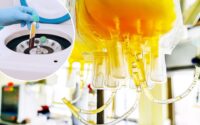Long COVID may make your hangovers much worse, researchers say
Getting a positive COVID-19 test may not only affect the way people taste and smell alcohol — it may also change the way they process it.
Anecdotal data has found that some people have reported a change in how their bodies react to booze after testing positive for the coronavirus.
Rebekah Stein, 30, used to be able to hold her liquor before being diagnosed with COVID in March 2020, she told BuzzFeed News.
Then one night after her mild symptoms went away, she casually stole a sip of her husband’s whiskey, as she had done plenty of times before.
After just seconds of the brown alcohol working its way down her throat, she felt very intoxicated.
The next day she was left with an intense hangover that she felt was undeserving of one small sip. She reported experiencing an irregular heartbeat, chest pain, cough, sore throat, headache and stuffy nose on top of other long COVID symptoms: shortness of breath, regular fevers, full body aches and exhaustion.
It was “basically COVID relapse,” Stein said.

“When this was first occurring, I hadn’t connected the dots. I would wake up and take a COVID test because I had all the COVID symptoms, and when I drink my heart rate gets really high overnight,” Stein told BuzzFeed.
“My body seems to know it’s being poisoned pretty quickly.”
Now, almost three years after her initial COVID diagnosis, Stein is still unable to enjoy any kind of alcohol.
Alcohol tolerance is commonly referred to as the amount that one can handle before becoming visibly intoxicated, but alcohol intolerance is an inherited metabolic disorder.
Metabolic disorders affect your metabolism by impacting the way your body converts and uses energy, meaning that alcohol intolerance is diagnosed when the body can’t efficiently break down alcohol.

While it’s not an allergy to alcohol, it can lead to a stuffy nose, skin flushing, hives, low blood pressure, nausea, vomiting and diarrhea, according to the Mayo Clinic.
Like other food and drink intolerances, an alcohol intolerance can be developed over time, but many are suspecting that it may be one of the many undetermined lingering side effects of long COVID.
A growing number of people are connecting on social media as they turn to Google and online forums trying to determine if there’s a connection between the new ways their bodies are reacting to alcohol and their previous COVID diagnoses.
According to Addiction.net, along with the usual symptoms of alcohol intolerance, people have reported:
- reduced tolerance for alcohol
- feeling sick after just a few sips of alcohol
- poor mental health for days after drinking alcohol
- increased anxiety after drinking alcoholic beverages
- worsened symptoms of long COVID
“Two glasses of rum last night has led to a blinding migraine today. Wondering if there’s a link to covid and an increase in alcohol intolerance because this only started happening after I got it,” one person tweeted about their own unexpected hangover.
Another Twitter user was a little more confident in her suspicions, sharing: “I somehow developed an alcohol intolerance from covid, so now when I drink I get a rash and it makes me feel completely sick the next day no matter how much or how little I drink.”
“One of the long term COVID consequences I have is alcohol intolerance,” one person claimed about their new sensitivity to booze. “I used to drink wine or beer exclusively before, but now even a glass of lager makes my sleep horrible and ruins the next day – I become unfocused, anxious, and tired. Who the hell knows how this illness works.”

Medical experts have several suspicions as to why COVID may lead to an alcohol intolerance, observing that the virus may directly affect the enzymes responsible for processing alcohol and/or damage the liver, thereby affecting how it metabolizes alcohol.
Others have hypothesized that both COVID and drinking alcohol activate mast cells that cause allergic reactions and release histamines, creating an influx of these immune responses.
Some have also noted that many COVID patients experience issues with their blood flow, which is known to worsen when consuming alcohol.
The post-COVID/long COVID and alcohol intolerance connection has not yet been studied by any official organizations or experts but is expected to join the growing list of COVID-related research that is sure to come.
One thing that research has confirmed, though, is that “drinking alcohol, even a small amount, is damaging to everyone, regardless of age, sex, gender, ethnicity, tolerance for alcohol or lifestyle,” according to a newly released recommendation out of Canada.
That’s potentially a lot of incentive if you’re considering stopping or limiting your alcohol consumption due to a possible COVID-induced alcohol intolerance, fulfilling a “dry January” bet or plunging into the “sober curious” trend.


